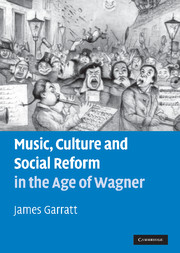Book contents
- Frontmatter
- Contents
- Acknowledgments
- Abbreviations
- Introduction
- 1 Liberalism, autonomy and the social functions of art
- 2 Radical and social aesthetics in the Vormärz
- 3 Speaking for the Volk: music, politics and Vormärz festivals
- 4 Revolutionary voices: blueprints for an aesthetic state
- 5 Music and the politics of post-revolutionary culture
- 6 The song of the workers: idylls and activism
- Notes
- Bibliography
- Index
4 - Revolutionary voices: blueprints for an aesthetic state
Published online by Cambridge University Press: 05 July 2011
- Frontmatter
- Contents
- Acknowledgments
- Abbreviations
- Introduction
- 1 Liberalism, autonomy and the social functions of art
- 2 Radical and social aesthetics in the Vormärz
- 3 Speaking for the Volk: music, politics and Vormärz festivals
- 4 Revolutionary voices: blueprints for an aesthetic state
- 5 Music and the politics of post-revolutionary culture
- 6 The song of the workers: idylls and activism
- Notes
- Bibliography
- Index
Summary
All that oppressed and harmed you is destroyed, and from the rubble of the old order arises a new world of unimagined bliss. Hate, envy, rancour and antagonism are henceforth banished from your midst; recognize yourselves as brothers – free, free in will, free in action, free in enjoyment – and bear witness to the value of life … The poor, hungry and wretched are no more. Lifting themselves proudly, inspiration shines from their ennobled faces and a gleaming light streams from their eyes, and with the earth-shattering cry ‘I am a man!’, the millions – the revolution made flesh, the men raised to divinity – move through valleys and plains, proclaiming the new gospel of happiness to the whole world.
By April 1849, when Wagner penned these lines, few Germans shared his view that revolution could bring forth a paradise on earth. But a year earlier, such visions of a complete transformation of society were articulated by musicians of all shades of the progressive political spectrum. From their perspective, the coups d'état and popular uprisings that spread eastwards from France in late February and March 1848 inaugurated a new age, promising not merely an end to absolutist rule but a radical overhaul of every aspect of life. For liberal musicians and critics, just as for their counterparts in other spheres of culture, the elation of the March Days was quickly followed by a period of painstaking reconstruction.
- Type
- Chapter
- Information
- Music, Culture and Social Reform in the Age of Wagner , pp. 128 - 155Publisher: Cambridge University PressPrint publication year: 2010



